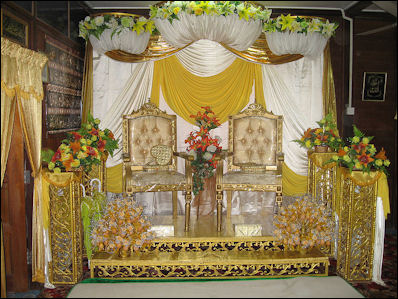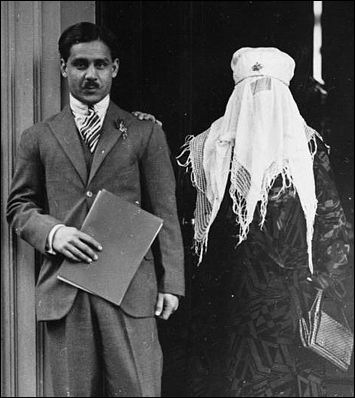Home | Category: Muslim Marriage, Family and Funerals / Arab Life, Marriage, Family and Funerals
MUSLIM DIVORCE

Malaysian wedding seats Under sharia a man has an automatic right to divorce but a woman does not. A man may divorce his wife by merely declaring his intension three times without any judicial authority. The right is confirmed by several passages in the Qur’an and they don’t specify any reasons or justifications for doing so. The rights of women is more restricted. They generally can not initiate a divorce through simple declaration but are required to get a approval of her husband and this often requires her or hand over part of her bride price if she is the initiator of the divorce.
Divorces can be obtained by a woman in a Sharia courts if a husband refuses to divorce her. In some case the wife can get an annulment based on her husband’s failure to pay a dowry or maintain her. A common way for married women to protect themselves these days is to include various stipulations in the marriage contract along with a statement the wife can divorce her husband and receive compensation if the obligations are not met. These days, many countries allow stipulations that forbids the husband from taking multiple wives even though it contradicts the Qur’an.
Shia practice differs from that of the Sunnis concerning both divorce and inheritance in that it is more favorable to women. The reason for this reputedly is the high esteem in which Fatima, the wife of Ali and the daughter of the Prophet, was held. Explaining the reason behind some divorces an Islamic scholar told the Los Angeles Times, “If a man can’t satisfy his wife she may commit adultery and that may open the door to prostitution. To project her against sin if he can’t satisfy her, she has the right to divorce.”
Websites and Resources: Islam IslamOnline islamonline.net ; Institute for Social Policy and Understanding ispu.org; Islam.com islam.com ; Islamic City islamicity.com ; BBC article bbc.co.uk/religion/religions/islam ; University of Southern California Compendium of Muslim Texts web.archive.org ; Encyclopædia Britannica article on Islam britannica.com ; Islam at Project Gutenberg gutenberg.org ; Muslims: PBS Frontline documentary pbs.org frontline
RECOMMENDED BOOKS:
“Marriage in Islam: A short guide to basic Islamic marriage teachings plus tips for a healthy and happy marriage” by Layal Husni Amazon.com ;
“The Muslim Marriage Guide” by Ruqayyah Waris Maqsood Amazon.com ;
“Handbook of a Healthy Muslim Marriage” by Abdur-Rahman ibn Yusuf Mangera Amazon.com ;
“Women in Islam: What the Qur'an and Sunnah Say” by Abdur Raheem Kidwai Amazon.com ;
“Secrets Of Successful Muslim Wives: Muslima Coaching Wife Tips Series” by Naielah Ackbarali and Muslima Coaching Amazon.com ;
“Before the Nikah: Proven Principles to Help Single Muslims Choose Wisely and Build Strong Marriages” by Dr P Aneesah Nadir Amazon.com ;
“Before the Wedding: Questions for Muslims to Ask Before Getting Married” by Munira Lekovic Ezzeldine Amazon.com ;
“The Sex Talk: A Muslim's Guide to Healthy Sex & Relationships”
by HEART to Grow, Nadiah Mohajir, et al. Amazon.com ;
“Marriage and Sexuality in Islam” by Imam Al-Ghazali Amazon.com ;
“Polygamy in Islam: A Muslim Marriage Guide to Fostering Harmony and Fairness with Multiple Wives” by Muhammad Zakari Amazon.com ;
“Polygamy in Islam” by Abu Ameenah Bilal Philips and Jameelah Jones Amazon.com
Divorce — a Last Resortin Muslim Society
The Qur’an and Prophetic traditions in the Sunnahs and Hadiths both emphasize the seriousness or divorce and describe how it should not be taken lightly. Muhammad is reported to have said, "Of all the permitted things, divorce is the most abominable with God," and an authoritative legal manual describes divorce as "a dangerous and disapproved procedure as it dissolves marriage … [It is] admitted, but on the ground of urgency of relief from an unsuitable relationship." [Source: John L. Esposito “Worldmark Encyclopedia of Religious Practices”, 2000s, Encyclopedia.com]
Surveys among Muslims show that they are more than twice as likely to disapprove of divorce than people in Western countries. George P. Monger wrote in “Marriage Customs of the World From Henna to Honeymoons”: “ The religious versus the civil view of divorce can be an uneasy topic, even in societies where the concept and acceptance of divorce is considered within the marriage contract. Muslims, for example, ensure that the woman has some sort of support in the event of a divorce. In Egypt, at the time of the engagement, a divorce settlement is agreed upon. If the wedding does not proceed, with the groom pulling out of the arrangement, he has to pay 50 percent of the settlement. [Source: “Marriage Customs of the World From Henna to Honeymoons”: “ by George P. Monger, 2004]
According to “Human Sexuality: An Encyclopedia”: Islam urges those with marital difficulties to seek professional, medical, or familial assistance, with divorce as the very last resort. Although divorce is relatively easy to obtain, its rate is extremely low, as it is still viewed as a disgrace to both the divorcees and their families. Families and friends intervene, pressure, and arbitrate to solve marital problems. Each party's grievances, particularly the wives', are taken seriously, and reconciliation is tried by every possible means. Furthermore, "divorce, in the eyes of Allah, is the most hated permissible." Hence, for religious, social, familial, and practical reasons, divorce may be considered with great reluctance, for not only is it difficult for divorcees, especially women, to remarry, but also the dissolution of the family casts a permanent shadow over its members' lives. For these reasons, couples are frequently compelled to stay together even when their marriage has become meaningless, worthless, and even hellish. Due to the serious complications and ramifications of divorce, Muslims are urged to approach it with painstaking deliberation and consideration. They are reminded that "you may dislike something (marriage) through which God would effect bountiful good for you" (Holy Qur'an, IV, No. 19). [Source: “Human Sexuality: An Encyclopedia”, Haeberle, Erwin J., Bullough, Vern L. and Bonnie Bullough, eds., sexarchive.info]
Muslim Divorce Process
Islam has always recognized the right to divorce under certain circumstances. Generally, in Islamic societies, if a woman wants a divorce from her husband, she forfeits her household goods and dowry. If the husband divorces his wife, she takes the remainder of her dowry and the household goods that she brought to the marriage. Both men and women may divorce, and a reconciliation is allowed twice. If they divorce a third time, then it becomes final and irrevocable. The idea of saying “I divorce you” three times to finalize a divorce comes from this. [Source: “Marriage Customs of the World From Henna to Honeymoons”: “ by George P. Monger, 2004]

Muslim couple in London The divorce process is started when the man (and in some cases the woman) utters the words, "I divorce you" or "I divorce" or "I divorce thee." This should be said only once, not three times as some people believe. If it is said three times it implies a triple repudiation of the marriage which means that it is forbidden for couple to remarry. The words can also written down, said over the telephone, or mailed in a letter. Muslims regard both marriage and divorce as verbal contracts. [Source: Arab News, Jeddah]
Men and women are not allowed to divorce each other if the woman is having her period or if sexual intercourse has taken place. After a divorce has been declared there is a waiting period that lasts for three months or three menstruation periods. During this time the woman continues to live in her husband's house, but she doesn't have to any housework.
If the couple wishes to be reunited they can do so at any time within the waiting period without a new marriage contract. If the couple decides they do not want to get back together after the waiting period is up the divorce is then complete and the woman moves in with her family or some other place agreeable to the former husband. A new marriage contract is required is the couple get back together. A divorced couple is allowed to get back together a second time but not a third time unless each has married someone else and divorced them. [Source: Arab News, Jeddah]
Muslim law carefully defines the divorce procedure, allowing time for reconciliation. For three months after a divorce a woman can not marry anyone other than her ex husband. This is done to allow for reconciliation and determine paternity in cases of a pregnancy. During this time the husbands has to support his ex wife and she must live in a place agreeable to him.
Women and Muslim Divorce
Islam gives women rights to child custody and alimony. After a divorce a woman is given half of all property and/or is entitled to get dowry. On the matter of divorce the only thing the Qur’an states is that husbands who “decide to take one wife in place of another” must pay their ex-wives full dowries, and that wives who fear “cruelty or desertion” by husbands are entitled to seek an “amicable settlement.” The father or his family typically gets custody of boys over six and girls who have reached puberty but the laws vary from place to place and differ between the different legal schools.
Ali Gomaa, the Grand Mufti of Egypt and one of the highest-ranking clerics in Sunni Islam, was asked by a man what he should do if his wife wanted a divorce but he didn’t want to grant it. The mufti told him, “set her free, You have neglected some part of your duty, and she doesn’t want you any more. That’s it.”
Among Bedouins, divorce has traditionally been fairly common and can be initiated by the man or women according to Muslim traditions. When it occurs the woman has generally returned to live with her parents
Many women stay in bad marriages to avoid poverty and keep their children. Women who seek divorce and child support from husbands who regularly beat them are often denied legal action because their husbands don't show up in court and no one forces them to.
Unfairness of Muslim Divorce to Women
 The Qur’an doesn’t say anything about divorce being easier for men than women but that is often the case in practice. Men can typically divorce their wives on a whim and without justification — Muslim law allows a man to abandon a childless wife or unilaterally end a marriage without recourse — while women need a good reason (insanity of the husbands, impotence or denial of the wife’s rights). After a divorce women are sometimes stigmatized and discriminated against because they have no husband and they are no longer virgins. One Muslim woman told Time, “Islam supposedly gives me the right to divorce. But what about my rights afterwards?”
The Qur’an doesn’t say anything about divorce being easier for men than women but that is often the case in practice. Men can typically divorce their wives on a whim and without justification — Muslim law allows a man to abandon a childless wife or unilaterally end a marriage without recourse — while women need a good reason (insanity of the husbands, impotence or denial of the wife’s rights). After a divorce women are sometimes stigmatized and discriminated against because they have no husband and they are no longer virgins. One Muslim woman told Time, “Islam supposedly gives me the right to divorce. But what about my rights afterwards?”
Charles F. Gallagher wrote in the “International Encyclopedia of the Social Sciences”: Probably a greater impediment to family stability than polygamy has been the classical mode of divorce through repudiation. Traditionally, the husband may repudiate his wife in unilateral fashion by simple pronouncement and repayment of the balance of the dowry. The shara’ah mitigates this somewhat by applying numerous conditions, but, in effect, the wife is subject to being divorced, with all the consequent stigma, without any effective legal recourse except under extraordinary circumstances. [Source: Charles F. Gallagher, “International Encyclopedia of the Social Sciences”, 1960s, Encyclopedia.com]
Successive repudiations are often equivalent to serial polygamy, and they have been and still are widespread in parts of Muslim society, particularly among the poor, where the dowry is inconsequential or nonexistent. In this domain, too, the law is gradually changing; in recent years Egypt, Morocco, and several other countries have made repudiation more difficult, while the more secularly oriented states have outlawed the practice.
Image Sources: Wikimedia Commons
Text Sources: Internet Islamic History Sourcebook: sourcebooks.fordham.edu ; Arab News, Jeddah; “Islam, a Short History” by Karen Armstrong; “A History of the Arab Peoples” by Albert Hourani (Faber and Faber, 1991); “World Religions” edited by Geoffrey Parrinder (Facts on File Publications, New York); “Encyclopedia of the World’s Religions” edited by R.C. Zaehner (Barnes & Noble Books, 1959); Metropolitan Museum of Art, Encyclopedia.com, National Geographic, BBC, New York Times, Washington Post, Los Angeles Times, Smithsonian magazine, The Guardian, Al Jazeera, The New Yorker, Time, Newsweek, Reuters, Associated Press, AFP, Library of Congress and various books and other publications.
Last updated April 2024
